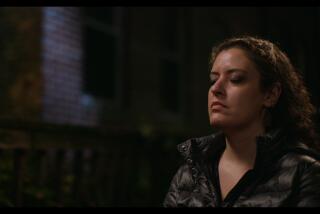ON BEING PSYCHED OUT
What a courageous and challenging piece (âPsyched Out,â by Mary Kay Blakely, Oct. 3). Itâs rare to find clearly stated truths that elicit a shift in consciousness and teach us to think differently. Blakely has shaken my resistance to knowing the truth about the real world out there.
I only hope that we psychotherapists can meet this challenge with the integrity required to accomplish real change, that we can begin to be activists and âwatchdogs,â and avoid the temptation to provide comfort and symptom relief in lieu of deeper confrontation with reality.
What a mind opener!
LINDA CARSON
Studio City
Blakely is right: We canât put all our faith in personal solutions. You can make all the ârightâ personal choices--good job, nice house, nice car, lovely family--but what good does it do? Youâre afraid to drive your nice car for fear youâll be carjacked; your nice house is wired for burglars; youâre afraid to let your son go out for fear heâll end up as the âcollateral damageâ in a gang war.
Weâre all in this together, and itâs time we stopped pretending that we can ignore our common welfare and still prosper as individuals.
RHONDA ALBEY
South Pasadena
As a psychologist, I disagree with Blakelyâs premise that most mental health problems in the United States result from a political disease brought about by rapidly increasing levels of discrimination, violence, harassment and injustice. Rather, the rising rates of emotional distress she cites are due to our rapidly expanding technology.
With TV, satellites and computers, people are getting more extensive and instantaneous coverage of world events than ever before, a sensory overload that can lead to a sense of despair. Imagine TV showing the Spanish Inquisition, the French Revolution, child-labor conditions in Victorian England or World War I; violence and loss of life and freedom are not new.
What is new is that we are now exposed to a global array of distant, troubling events that we feel we cannot change. In that sense, Blakelyâs suggestion that political activism can help people cope is useful. By tackling a local problem, individuals can begin to regain a sense of control over their environment.
MARY ELLEN MCNAUGHTON
San Diego
Rapid change and stress have been the hallmarks of American society, and we are living better today than ever before. Homelessness and unemployment were far worse during the Depression. How many European women were treated for agoraphobia after undergoing World War II bombing raids?
Sure, we have many national problems, but letâs not lose our focus by overdramatizing the less likely or more trivial issues. We should not be distracted from the seminal concerns that are within our control, such as lower taxes to stimulate the economy, gun control, illegal immigration, illegal drugs, violence and decadence in the media, graduated improvements to our current health care, and better schools.
H. M. WHITFIELD
Coronado
There is something ironic about reading âPsyched Outâ in the magazine, where glossy pages tout the latest fashions and cover (read: create) the latest styles, all the time pounding home the essential American ethos: consume, consume, consume. I turn to the comic pages for relief, only to be reminded that The Times is âour Source for keeping up.â Iâm trying. On Monday, Iâll visit the chiropractor and attend my menâs group. Am I doing this right?
ANDREW TILLES
Los Angeles
I suggest a different approach, the recognition of social commandments the source of which is spiritual. The Lord and His disciplines are not mine and they are not yours; theyâre His. We are given a rock to stand on in our clearly outrageous world when we recognize His personal communication of standards to us through Christ. It is only when we have done so that our activism will have the wisdom and power to alter a human course that began with our own failures.
ROGER APPLEWHITE
Torrance
I donât know any more about Steve Young than I did before--which is nothing--because I didnât read your cover article. The cover--in fact, the entire magazine--ought to have been devoted to âPsyched Out,â the first thing Iâve read in a long time that makes sense and is, therefore, somehow terrifying.
KEITH S. WALL
Long Beach
Blakely only confirms what Iâve always suspected. I am not the one who is crazy. It is the world thatâs crazy.
JAMES PHILIP HIGHFILL
Canoga Park


